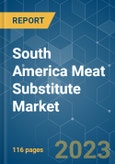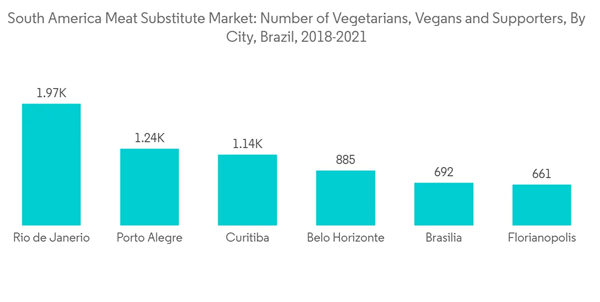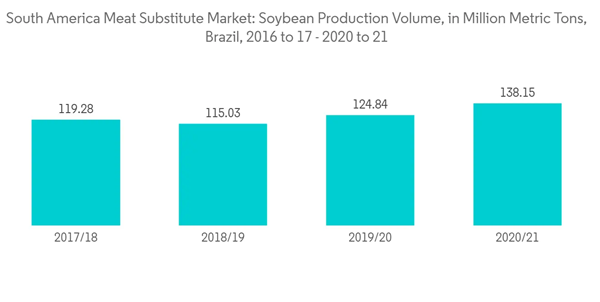The South American meat substitute market is projected to register a CAGR of 11.45% during the forecast period.
Key Highlights
- Due to the rising recognition of the advantages of a vegetarian diet, the demand for plant-based meals expanded along with changing lifestyles. This, in turn, drives the growth in the meat substitute market. Although animal sources are rich in protein, the excessive consumption of animal-based products may result in chronic diseases, including obesity, cardiovascular disorder, and diabetes.
- Due to the above factors, meat consumption has stagnated across Latin America and is expected to decrease in the coming years. According to CONAB, Brazil's meat consumption dropped from 20.2 million metric tons the year before to under 20 million tons in 2022.
- Additionally, in recent years, the growing concern about animal abuse for meat production has greatly impacted the way consumers think about meat consumption. This factor further changes the consumer's choice of plant-based meat products to reduce animal slaughtering for meat and thereby increase the demand for meat analogs in the market.
- For instance, in 2021, a global survey by Green Queen on changing consumers' patterns towards vegan diets involving 8500 participants across 100 countries reported that nearly 90% of respondents cited animal welfare as a primary reason for the inclination toward a plant-based diet.
- However, plant-based meat has low cholesterol levels, saturated fats, and calories and is enriched with micronutrients such as calcium and zinc. Thus, the growing consumer consciousness regarding health is increasing the demand for plant-based meat products and further fueling market growth.
- Owing to the consumer demand for meat analogous, the manufacturers are focusing on producing innovative plant-based meat products to cater to the need. Further, the consumers perceive that replacing animal-based meat with meat substitutes can lower the risk of heart disease as plant-protein food can lower cholesterol levels.
South America Meat Substitute Market Trends
Emerging Vegetarian Diet Culture
- In the past decade, the vegan population has been growing
- steadily owing to the rising awareness regarding healthy and sustainable foods, which increases the demand for plant-based meat alternatives in the market studied. With changing lifestyles, the need for plant-based foods also increased due to the growing awareness about the benefits of a vegetarian diet.
- Implementing a vegetarian diet can reduce the risk of several diseases. Plant-based meat can help reduce the risk of cancer and lower cholesterol. Most vegetarians include middle- or upper-class urban dwellers from the country's central and southern parts.
- A vegetarian diet can positively affect the environment, one of the significant reasons for boosting the region's per capita spending on meat substitutes. According to an online study by Mapa Veg in September 2022, Sao Paulo had the most significant percentage of self-described vegetarians, vegans, and supporters in Brazil, with more than 4.2 thousand respondents. With around 2000 inhabitants, Rio de Janeiro had the second-largest population.
Textured Vegetable Protein as the Largest Segment
Textured Vegetable Protein (TVP) is also known as soy protein, a soy flour product. It holds a major share of the meat substitute market. It is used in many meat products such as burger patties, frankfurters, nuggets, sausages, and meatballs. The major features of textured vegetable protein are to provide the desired quality, texture, binding ability, and the appropriate amount of chewiness. It has an elastic and spongy texture that makes it suitable for products such as patties, sauces, and stews.
There are mainly two types of TVPs: wheat-based TVP and soy-based TVP. Due to the increase in the demand for such sources, the production of wheat and soy has been increasing in the Latin American regions.
For example, according to the Brazilian Institute of Geography and Statistics, in terms of value, soybeans were Brazil's most significant crop in 2021, accounting for 46% of the nation's agricultural output. The country's soybean production was 138.15 million metric tons in 2020/21, according to CONAB, which was higher than the production in the previous year.
Furthermore, TVPs are a blend of soy isolates and soy concentrates or wheat gluten and wheat protein. Wheat-based TVP is lighter in color, while soy-based is darker. The lighter is used for substitutes such as meats like pork and turkey, and the darker is used as a substitute for red meat. Thus, the consumers get both taste and protein while using TVP, which is one of the major reasons for its demand growth.
South America Meat Substitute Market Competitor Analysis
The market is competitive and fragmented due to the presence of various local and international players in the segment. The major players in the market are Beyond Meat Inc., Tyson Foods Inc., Kellogg's Co., Turtle Island Foods (Tofurky), and Impossible Foods Inc. The key players are focusing on product development and innovation to meet the consumers' needs by offering a variety in taste and quality to maintain premiumization. Some major players use mergers and acquisitions as their key strategy to maintain dominance over other players in the industry.
Additional benefits of purchasing the report:
- The market estimate (ME) sheet in Excel format
- 3 months of analyst support
This product will be delivered within 2 business days.
Table of Contents
Companies Mentioned (Partial List)
A selection of companies mentioned in this report includes, but is not limited to:
- Beyond Meat Inc.
- Tyson Foods, Inc.
- The Superbom
- Impossible Foods Inc.
- Turtle Island Foods (Tofurky)
- Kellogg's Company
- Gardein Protein Inc.
- Unilever Plc (The Vegetarian Butcher)
- Quorn Foods
- Amy's Kitchen










